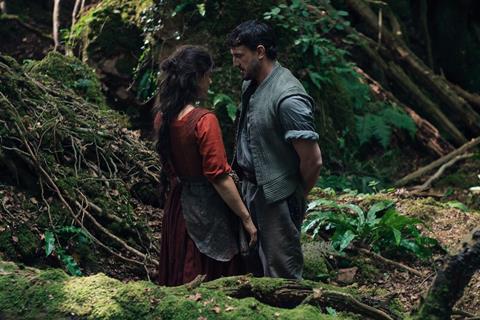
Dir: Chloe Zhao. UK. 2025. 125mins
A delicate exploration of how art can address (but never fully heal) personal pain, Hamnet is a potent love story anchored by Jessie Buckley and Paul Mescal’s expertly modulated performances. Chloe Zhao’s adaptation of the 2020 Maggie O’Farrell novel charts the romance between William Shakespeare and his wife Agnes as the couple experience wedded bliss and then the tragic death of their son, which inspired the birth of the Bard’s heralded Hamlet. Where other films reduce the act of creation to a simplistic cause-and-effect scenario, Hamnet far more profoundly investigates how love and art shift in intensity and clarity over time.
Buckley and Mescal imbue their characters with a casual immediacy
Playing in Toronto after premiering in Telluride, the picture – which has Steven Spielberg and Sam Mendes among its producers – will next be coming to London before opening in the US on November 27 and the UK in early 2026. Zhao is a favorite of arthouse audiences thanks to her acclaimed dramas The Rider and Nomadland, the latter of which won the top prize at Bafta and the Oscars in 2021. Her well-respected leads will only further bolster Hamnet’s cachet, and the film’s plotline will inspire comparisons to Shakespeare In Love.
Set in England over the final two decades of the 16th century, Zhao’s film introduces us to Agnes (Buckley), an expert falconer, and Will (Mescal), a Latin tutor who longs to be a writer. Quickly falling in love, they marry and have three children, the happiness of their rustic Stratford-Upon-Avon home only interrupted by Will’s occasional journeys to London to workshop his plays. But when their only son, 11-year-old Hamnet (Jacobi Jupe), succumbs to the plague, Agnes and Will face the first severe challenge to their relationship, their grief turning to animosity between them.
Hamnet could roughly be described as the imagined origin story of how Shakespeare’s Hamlet came to be. But such a blunt synopsis ignores the complexity that Zhao and co-writer O’Farrell apply to this deceptively slender episodic narrative. Partnering with Zone Of Interest cinematographer Lukasz Zal, Zhao shoots Hamnet’s woodland scenes in Gloucestershire’s Lydney Forest, enveloping the lovers in an earthly paradise that makes them seem almost like Adam and Eve. The scenes feel less constructed than they do offhandedly observed, as Buckley and Mescal imbue their characters with a casual immediacy. Zhao’s lightness of touch allows for no portentous hints of Will’s later greatness, instead simply showing him through his wife’s loving eyes. (Notably, we do not hear the name William Shakespeare uttered until near the end of the picture — until then he’s just known as Will.)
Once tragedy strikes, Hamnet begins to operate in a gloomier emotional register. Hamnet’s unexpected death is staged with raw anguish; because Will is away in London, Agnes begins to blame him for Hamnet’s passing and their interactions grow more bitter and terse. Early on in Hamnet, Buckley and Mescal convey their characters’ passionate disposition, as untamed as their lush surroundings. But the death of their child threatens to sever the bond they had never before doubted.
The graceful chemistry of the leads leaves ample room for each character’s personality to shine. Although they clearly love one another, Agnes and Will are their own people — she has a storminess behind her eyes, he’s more of a dreamer — and Zhao respects them enough to see them as individuals. Mescal’s poetic, wounded Will is very much in keeping with the actor’s previous roles, such as Aftersun, but the regularly superb Buckley is revelatory as a wild creature who experiences the exhilaration of motherhood as well as the heartbreak of loss. With Will often gone, it falls on Agnes to maintain their home, and Buckley articulates her character’s abandonment and sense of betrayal.
It’s here where Hamnet makes its dramatic third-act pivot. As the film begins, onscreen text informs us that, during this time period, the names Hamnet and Hamlet were interchangeable, a hint of where this story will ultimately go. But there is nothing coy in Zhao’s reveal that Will has channeled his grief into Hamlet, his creative process depicted with a refreshing matter-of-factness.
When at last we and Agnes witness Hamlet’s debut – in which Noah Jupe takes the role of the actor playing Hamlet – the play’s connections to earlier moments in the film are subtly unveiled, the parallels to the couple’s heartbreak intuitive rather than obvious. Hamlet may be an epochal work, but Zhao doesn’t treat it with momentousness. Rather, she sees it as a tender love letter from Will to his wife; one that is woven beautifully into the film’s larger portrait of a couple’s undying devotion.
Production companies: Hera Pictures, Neal Street, Amblin Entertainment
Worldwide distribution: Universal Pictures
Producers: Liza Marshall, Pippa Harris, Nicolas Gonda, Steven Spielberg, Sam Mendes
Screenplay: Chloe Zhao & Maggie O’Farrell, based on the novel Hamnet written by Maggie O’Farrell
Cinematography: Lukasz Zal
Production design: Fiona Crombie
Editing: Chloe Zhao, Affonso Goncalves
Music: Max Richter
Main cast: Jessie Buckley, Paul Mescal, Emily Watson, Joe Alwyn, Noah Jupe, Jacobi Jupe


